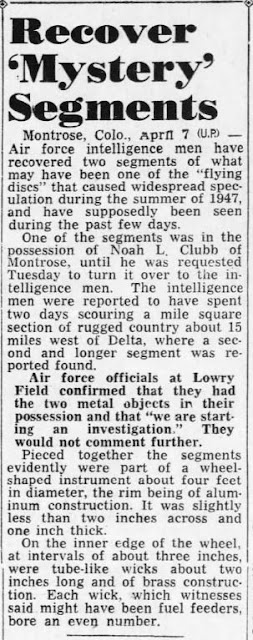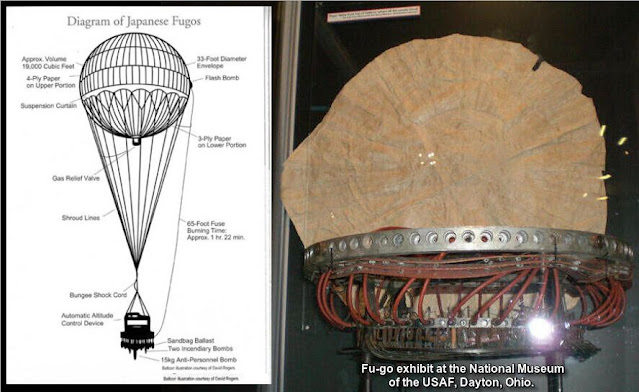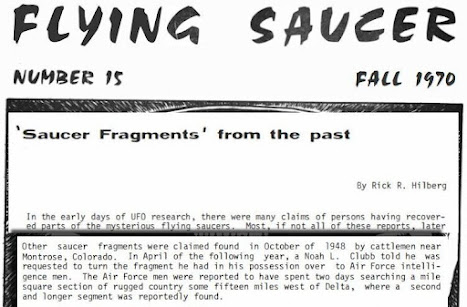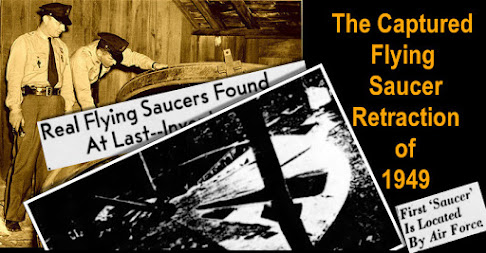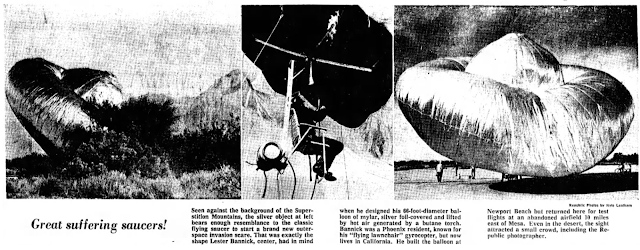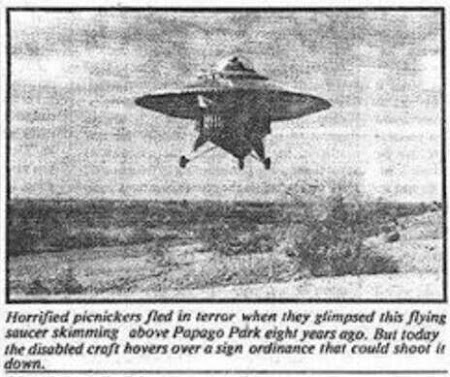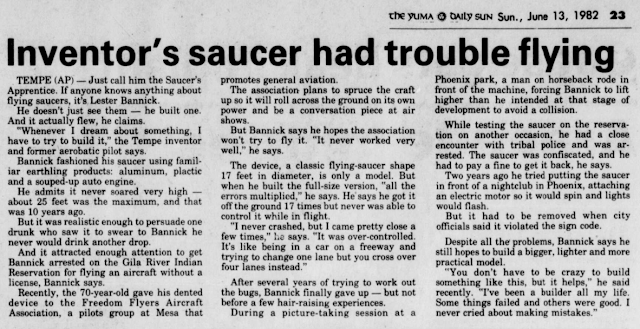Three days before the saucer news broke from Roswell, New Mexico, a flying disc crashed on a farm in Ohio. In the following weeks (and years) other objects were found, some of them photographed and printed in newspapers.
 |
| July 7, 1947, Associated Press |
Our Captured Flying Saucer Scrapbook begins with an item from The Circleville Herald, July 5, 1947:
'Flying Disc' Believed Found On Pickaway Farm
One of the "flying discs" which have been puzzling aviators all over the United States was believed Saturday to have been found on a Pickaway county farm. Sherman Campbell, who lives on the Westfall road in Wayne township, near the Pickaway-Ross county line, reported the finding of a star-shaped silver foil covered object which he believes is one of the mysterious "flying saucers."
While working in the field he spotted a strange object. He described his find as 50 inches high, 48 inches wide and weighing about two pounds. He said the silver foil was stretched over a wooden frame. The star-shaped object had six points. He said there was a balloon attached which had deflated and there was no way of knowing how big it was.
Discovery of the object was the first reported in the country. A Coast Guardsman on the west coast reported photographing one from a distance, but no one has seen one of the "flying discs" close.
Another photo:
 |
| The Wisconsin State Journal, July 7, 1947 |
Yet another “flying saucer” was found in Oxford, Ohio, on Monday July 7, 1947, as reported in The Palladium-Item (Richmond, IN), July 9, 1947.
Saucers were everywhere. Amazingly, another strange object fell close to Circleville, Ohio.
“The second such find was reported to Sheriff Charles Radcliff Tuesday afternoon by David C. Heffner, who said he discovered it on a line fence on his farm on the old Tarlton road four and one half miles east of Circleville. ... The gadgets found by Mr. Campbell and Mr. Heffner were … constructed of a light wood frame. Only a remnant of the thin rubber balloon remained attached to the Campbell find, but the other contraption discovered on the Heffner farm includes most of the remains of the balloon which must have measured more than 15 feet in diameter when it was inflated."
 |
| The Circleville Herald, July 5, 1947 |
The Roswell Debris
The now-famous headline, "RAAF Captures Flying Saucer On Ranch in Roswell Region," appeared in the Roswell Daily Record, July 8, 1947. However they stated, “no details of the saucer's construction or its appearance had been revealed.” Newspapers the next day began revealing the disappointing details.
 |
| The Durant Daily Democrat, July 10, 1947 |
 |
| The Minneapolis Star, Minneapolis, July 9, 1947 |
The Roswell Daily Record, July 9, 1947, reported that Mac Brazel had been hounded by the press over his discovery, "Harassed Rancher who Located 'Saucer' Sorry He Told About It." The paper summarized Brazel’s description of what’d he’d found and shown Maj. Jesse A. Marcel from Roswell Army Air Field:
“Brazel related that on June 14 he and 8-year-old son, Vernon were about 7 or 8 miles from the ranch house of the J.B. Foster ranch, which he operates, when they came upon a large area of bright wreckage made up on rubber strips, tinfoil, a rather tough paper and sticks. … There was no sign of any metal in the area which might have been used for an engine and no sign of any propellers of any kind, although at least one paper fin had been glued onto some of the tinfoil.”
The debris was matched to other discoveries and military projects still in flight. The Kansas City Times, July 9, 1947, reported on a Rawin target recovered on an Adrian, Missouri farm.

The Kansas City Times, July 9, 1947
The Corpus Cristi Caller, July 10, 1947, reported:
Like New Mexico Saucer – The “rawin” – radar wind – reflector attached to the Navy weather balloon above, is the same type of apparatus which a New Mexico rancher picked up earlier this week, believing he had found one of the much-publicized flying discs which have been plaguing 44 states of the nation. Miss Mary belle Kuegle, Wave aerologist first class, holds the device which normally rises to a height of 50,000 feet before the balloon bursts and the rawin falls to the earth, aided by a parachute. (Official U.S. Navy photograph.)
 |
| The Corpus Cristi Caller, July 10, 1947 |
What is a Rawin? From Captain Joseph A. Pechman’s article in Air Corps, from The Coast Artillery Journal, May/June 1946:
“Radar made possible the determination of upper winds under most conditions of clouds or poor visibility. Wind data are obtained by an SCR-584 [radar unit] tracking the flight of a free balloon to which is attached a metal, foil-covered paper reflector capable of reflecting the radar signals back to the radar. Direction and speeds of the winds for various altitudes are evaluated on the basis of the horizontal projection of the flight of the balloon. This procedure is called ‘RAWIN’, a term combining the two words, ‘radar’ and ‘wind’.”
 |
| Launching and tracking a rawin target. |
Civilians were not only mistaking Rawin targets for flying saucers on the ground, but also in the sky. The United Press story in the Press and Sun Bulletin (Binghamton, NY), July 10, 1947, the US Navy disclosed that their balloon launches had led to saucer reports.
Disc? Tsk, Says NavySaucy Soaring Saucers SinkingPractical jokers continued to have a high time with flying saucers today as the navy advised the more serious-minded "eyewitnesses" that what they saw in the sky was only weather observation devices. It cost the navy $25 to assure itself. Lt. Rell Zelle Moore, naval air station aerology officer, launched a "ray winds" weather device is a $25 "operations saucer" at Atlanta, Ga. As the helium-filled balloon carrying a tin-foil screen soared over Stone Mountains, calls poured into Atlanta newspapers reporting "flying discs." The 4-by-10 foot screen looked like a round aluminum disc at a high altitude. "People are only just beginning to see these things aloft," said Lt. Comndr. Thomas H. Rentz.
The Gastionia Gazette (NC), July 10, 1947 feature more from the Naval officer:
HAS OPINION ON FLYING SAUCERS
Naval Officer Believes Flying Discs Are Tinfoil Screen Used In Weather Balloons To Reflect Radar Rays And Detect Wind's Velocity
ATLANTA, July 10 -- UP -- Lieut. Commander Thomas H. Rentz of the Atlanta Naval Air Station said today he believed the "flying saucers" reported over the country were tinfoil screens used in weather balloons.
The Roswell tinfoil episode was forgotten, but the International News Service (INS) article from April 10, 1949, published under such titles as “Secrecy Shrouds ‘Saucers’ Probe,” mentioned Roswell in passing:
“… the USAF has sorted out the vast number of fantastic and imaginative reports received... Another incident resulted in ‘exile’ for an Air Force public relations officer in the West. This enthusiastic gentleman, without prior reference to Washington, announced to local newsmen that he had found a ‘flying saucer’.”
Saturday Evening Post, April 30, 1949, featured the first of two parts of a skeptical article by Sidney Shallet, “What You Can Believe About Flying Saucers.” It included a section on rawin targets as UFOs:
In addition to the 25 per cent or more bona fide cases of mistaken identification that can be blamed on astronomical phenomena, a large percentage can be accounted for by weather-observation and radar-target balloons. . . . The most common sources of innocent deception in the balloon field are the so-called RAWIN (radar-wind) target balloons. The balloons generally are white, and at 40,000 to 60,000 feet where they usually operate, they are invisible to persons on the ground. Dangling below each balloon, however, is a six-cornered "target" of aluminum foil, strung out on kitelike sticks. Radar operators on the ground track these aluminum targets for weather information. The targets oscillate and gyrate in the wind, and sunlight glinting from these shiny, wind-tossed objects can create a perfect illusion of a flying saucer. Movies of airborne RAWINs were taken for me, and in some shots the oscillating aluminum targets appeared perfectly round.
Further Sightings in the Fifties
Around the USA, saucer reports kept being reported and sometimes, physical evidence was found. Here’s our two last entries that made the papers.
The Captured Saucer of Concord, Pennsylvania
On March 28, 1950, an unnamed farmer spotted a UFO descending and land in his field. He reported the object, and it was subsequently carried to the Concord School where it was on display for the 300 students there and the general public. The Chester Times, March 29, 1950, reported the mysterious object was:
“Four feet across at its maximum width, it was constructed of white and silver paper, on a thin wooden frame. Only identifying features on the strange-looking star shaped object with the numerals 1040. Obviously severed heavy strings were attached to a metallic ring on the object, indicating that a balloon had been hooked up to the ‘What-is-it.’ The balloon apparently broke loose when the strings gave away and it continued its flight. The farmer who first sighted the object reported this morning that spinning in the late afternoon sunlight, it gave every appearance of being a huge disk as rays were reflected from the white and silver body of the object.”
Local Weather Bureau, Army officials, and scientists were consulted, but they could not initially identify the object’s origin.
 |
| Chester Times, March 29, 1950 |
The next day continued the drama, “Concord’s ‘Flying Disc’ Subject of Much Speculation”
 |
| Chester Times, March 30, 1950 |
A subsequent story in the Chester Times, April 8, 1950, reported that the “kite-like affair” had been identified, “investigation disclosed [it] to be a corner reflector radar target.”
The Horton Disc of 1953
A UFO was seen in the skies of Atlanta, Georgia on July 6, 1953. The next morning, near the Fulton County Airport, Ralph Horton recovered an unusual flying object that had crashed on his lawn. From The Atlanta Constitution, July 8, 1953:
“Experts Tuesday were as baffled as ever about the multi-colored, cone-shaped ''thing" that dozens of Atlantans saw moving across the twilight sky around supper-time Mondav. The experts didn't think the ‘thing’ was the kite-shaped, balloon-bearing apparatus Ralph Horton found Tuesday morning in his front yard near the County Airport. U. S. Weather Bureau officials said Horton's find apparently is a ‘ra-wind,’ an instrument used to plot wind currents in the upper air. Such an instrument, they explained, would have been released by the Air Force at 4 p.m. and would not have remained aloft as long as 7:15 p.m. when Atlantans all over the city reported they saw the ‘thing.’”
 |
| The Atlanta Constitution, July 8, 1953 |
By this time, such discoveries were common. Once the Weather Bureau identified it as a rawin target, no investigation by Project Blue Book – or anyone was conducted. Until…
Working on a proposed flying saucer book, James Moseley made a cross-country trip in 1953-54 tracking down UFO witnesses. In Georgia, he found the Ralph Horton article in the files of the Atlanta Constitution. Moseley with Karl Pflock described what he did next in his 2002 book, Shockingly Close to the Truth!: Confessions of a Grave-Robbing Ufologist:
“Of course, I lost no time getting out to see Horton, who obligingly hauled the saucer out of the woods behind his house, where he tossed it after the excitement had died down. ... I photographed Horton with the saucer which he then offered to me. I took it with thanks. Unfortunately, it got lost in the shuffle over the years.”
 |
| Ralph Horton and his discovery. Photo by Jim Moseley |
Crashes of other military or meteorological balloon packages have resulted in other “crash-retrieval” cases, from the famous to the forgotten. While no single answer has been found for the flying saucer mystery, sightings and discovery of rawin targets added to the confusion, becoming part of UFO legends and history.
. . .


,%20July%209,%201947.JPG)



